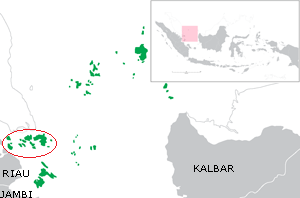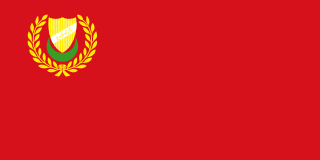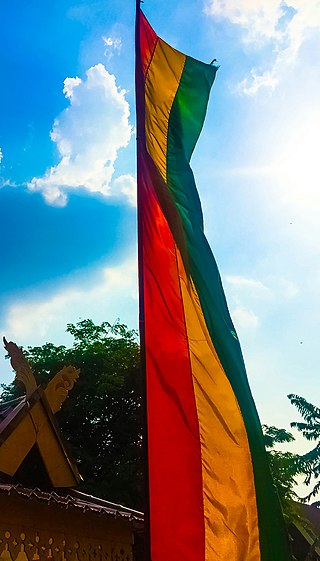
Malaysia is a modern concept, created in the second half of the 20th century. However, contemporary Malaysia regards the entire history of Malaya and Borneo, spanning thousands of years back to prehistoric times, as its history.

The Malacca Sultanate was a Malay sultanate based in the modern-day state of Malacca, Malaysia. Conventional historical thesis marks c. 1400 as the founding year of the sultanate by King of Singapura, Parameswara, also known as Iskandar Shah, although earlier dates for its founding have been proposed. At the height of the sultanate's power in the 15th century, its capital grew into one of the most important transshipment ports of its time, with territory covering much of the Malay Peninsula, the Riau Islands and a significant portion of the northern coast of Sumatra in present-day Indonesia.

Riau is a province of Indonesia. It is located on the central eastern coast of Sumatra along the Strait of Malacca. The province shares land borders with North Sumatra to the northwest, West Sumatra to the west, and Jambi to the south, and a maritime border with the Riau Islands and the country of Malaysia to the east. It is the second-largest province in the island of Sumatra after South Sumatra, and is slightly larger than Jordan. According to the 2020 census, Riau had a population of 6,394,087 across a land area of 89,935.90 km²; the official estimate of population as of mid-2022 was 6,614,384. The province comprises ten regencies and two cities, with Pekanbaru serving as the capital and largest city.

Malays are an Austronesian ethnoreligious group native to eastern Sumatra, the Malay Peninsula and coastal Borneo, as well as the smaller islands that lie between these locations. These locations are today part of the countries of Malaysia, Indonesia, the southern part of Thailand, Singapore and Brunei Darussalam.

The Riau Islands is a province of Indonesia - not to be confused with neighbouring Riau Province from which the islands were separated in 2002. The capital of the province is Tanjung Pinang and the largest city is Batam. It shares a maritime border with Riau and Jambi to the east, Bangka Belitung Islands to the south, Singapore to the northeast, Malaysia and West Kalimantan to the west, and Vietnam and Cambodia to the north. It comprises a total of 1,796 islands scattered between Sumatra, Malay Peninsula, and Borneo including the Riau Archipelago. Situated on one of the world's busiest shipping lanes along the Malacca Strait and the Natuna Sea, the province shares water borders with neighboring countries such as Singapore, Malaysia, and Brunei. The Riau Islands also have relatively large potential mineral resources and energy, as well as marine resources.

The Riau Archipelago is a geographic term for the core group of islands within the Riau Islands Province in Indonesia, and located south of Singapore and east of Riau on Sumatra. Before the province of Riau Islands was formed, there was no ambiguity in term; however, in Indonesian language, both the archipelago and administrative province are referred to simply as "Kepulauan Riau". The province may have the word "Provinsi" preceding it for clarity. Additionally, the term BBK for Batam Bintan Karimun may refer to the archipelago.

The Kedah Sultanate is a Muslim dynasty located in the Malay Peninsula. It was originally an independent state, but became a British protectorate in 1909. Its monarchy was abolished after it was added to the Malayan Union but was restored and added to the Malayan Union's successor, the Federation of Malaya.

Majidee Malay Village is a Malay village located in the city of Johor Bahru, Johor, Malaysia. Its population is around 30,000.

The Sultanate of Brunei or simply Brunei, also known as the Brunei Empire, was a Malay sultanate, centered in Brunei on the northern coast of Borneo Island in Southeast Asia. Brunei became a sovereign state around the 15th century, when it substantially expanded after the fall of Malacca to the Portuguese, extending throughout coastal areas of Borneo and the Philippines, before it declined in the 17th and 18th centuries. The first ruler or sultan of Brunei was a Muslim. It became a British protectorate in the 19th century.

Malay Indonesians are ethnic Malays living throughout Indonesia. They are one of the indigenous peoples of the country. Indonesian, the national language of Indonesia, is a standardized form of Riau Malay. There were numerous kingdoms associated with the Indonesian Malays along with other ethnicities in what is now Indonesia, mainly on the islands of Borneo and Sumatra. These included Srivijaya, the Melayu Kingdom, Dharmasraya, the Sultanate of Deli, the Sultanate of Siak Sri Indrapura, the Riau-Lingga Sultanate, the Sultanate of Bulungan, Pontianak Sultanate, and the Sultanate of Sambas. The 2010 census states that there are 8 million Malays in Indonesia; this number comes from the classification of Malays in East Sumatra and the coast of Kalimantan which is recognized by the Indonesian government. This classification is different from the Malaysia and Singapore census which includes all ethnic Muslims from the Indonesian archipelago as Malays.

Thai Malays, with officially recognised terms including 'Malayu-descended Thais' and 'Malay', is a term used to refer to ethnic Malay citizens of Thailand, the sixth largest ethnic group in Thailand. Thailand is home to the third largest ethnic Malay population after Malaysia and Indonesia and most Malays are concentrated in the Southern provinces of Narathiwat, Pattani, Yala, Songkhla, and Satun. Phuket Ranong, and Trang home to a sizeable Muslim population, also have many people who are of Malay descent. A sizeable community also exists in Thailand's capital Bangkok, having descended from migrants or deportees who were relocated from the South from the 13th century onwards.

The Pontianak Kadriyah Sultanate was an Islamic Malay state that existed on the western coast of the island of Borneo from the late 18th century until its disestablishment in 1950. It was founded in 1771 by Sultan Syarif Abdurrahman Ibni Alhabib Husein bin Ahmad Alkadrie, allegedly a descendant of Sayidina Husain, in the area of the mouth of the triple junction of the small Kapuas River and the porcupine river which included a small area area ceded by the Sultan of Banten to the Dutch VOC. He had two political marriages in Kalimantan, the first to the princess of the Mempawah Kingdom, Utin Chandramidi, and the second in 1768 to Ratu Syahranum of the Banjar Sultanate, earning him the title Pangeran Nur Alam.

Malayisation or Malayization is a process of assimilation and acculturation, that involves acquisition or imposition of elements of Malay culture, in particular, Islam and the Malay language, as experienced by non-Malay populations of territories fully controlled or partially influenced by historical Malay sultanates and modern Malay-speaking countries. It is often described as a process of civilisational expansion, drawing a wide range of indigenous peoples into the Muslim, Malay-speaking polities of Maritime Southeast Asia. Examples of Malayisation have occurred throughout Asia including in Brunei, Cambodia, Indonesia, Malaysia, Singapore, and Sri Lanka.

The Kingdom of Singapura was a Malay Hindu-Buddhist kingdom thought to have been established during the early history of Singapore upon its main island Temasek from 1299 until its fall sometime between 1396 and 1398. Conventional view marks c. 1299 as the founding year of the kingdom by Sang Nila Utama, whose father is Sang Sapurba, a semi-divine figure who according to legend is the ancestor of several Malay monarchs in the Malay World.

Riau-Lingga Sultanate, also known as the Lingga-Riau Sultanate, Riau Sultanate or Lingga Sultanate was a Malay sultanate that existed from 1824 to 1911, before being dissolved following Dutch intervention.

Malays played a significant role in pre-Hispanic Philippine history. Malay involvement in Philippine history goes back to the Classical Era with the establishment of Rajahnates as well as the Islamic era, in which various sultanates and Islamic states were formed in Mindanao, the Sulu Archipelago, and around Manila.

The Sultanate of Sarawak was a Malay kingdom, located in present-day Kuching Division, Sarawak. The kingdom was founded in 1599, after the conquest of the preceding Santubong Kingdom and the later Sultanate of Brunei.















